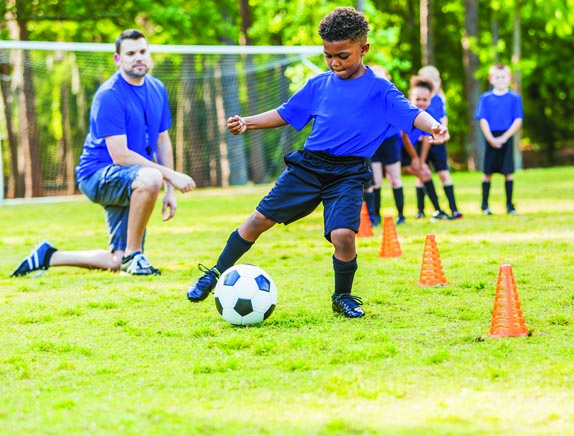Hundreds of East County students gathered in front of Granite Hills High School on Friday evening dressed in school colors along with their teammates.
However, the event was not a game; it was one of 138 rallies held simultaneously throughout California on Jan. 15 by Let Them Play, a group of over 35,000 parents, coaches and youth advocates who say continually delaying sports seasons to potentially slow the spread of COVID-19 is not worth increased rates of depression and teen suicide.
According to the Centers for Disease Control, the proportion of children’s mental health-related emergency doctor visits increased beginning in April 2020; compared with 2019, the proportion of mental health-related visits for children aged 5 to 11 increased 24 percent and visits for children aged 12 to 17 increased 31 percent.
Many of the students at Friday’s rally have not participated in any sports for almost a year now as California remains one of only six states with no hard date to reopen high school competitive sports seasons; San Diego County currently lingers in the purple or most restrictive tier of closures.
“You know, I was driving here and saw a huge billboard for SD Recreational Cannabis that said ‘We are essential’ and I want someone to look me in the eye and tell me why cannabis is essential but kids’ sports are not,” attorney and Let Them Play organizer Ken Elliott said.
Groups of kids loudly chanted “let us play” through their masks as they marched around the high school perimeter; several held up long butcher-paper posters painted with messages of teen mental health awareness.
El Capitan High School siblings Katie and Anthony Romero stood near a watchful parent with a sign stating ‘If the NFL, NBA, MLB and NCAA can figure it out, so can you!’
“Honestly, we don’t just want to play sports, we need to play for our physical and mental health,” Katie said.
Amanda Fleischer kept her younger children in a stroller while standing alongside her oldest daughter, 17-year-old Faith Sandoval, a Granite Hills High School senior who is waiting to hear if there will be a softball season.
“I don’t get why professionals can play but kids can’t, there is nothing sensible about limiting one group and allowing another one, just like with daycare and school. We can pay to send a young child to daycare where they all play together outside, but we can’t send a teenager to school with sports outside? Something isn’t adding up,” Fleischer said.
“I’m just sitting at home every day doing nothing,” Faith said.
Granite Hills High School parent Kyle McComb also coaches youth football and said he talks with enough parents to believe many of them are generally keeping their kids active but recognizes without the level playing field of public school, some kids are left without any avenue for sports competition or outlet for emotional interaction.
“I think the biggest inequity here is with the kids who are hurt the most, those who might not have an opportunity economically to allow for anything outside of school, the ones who don’t get a chance to go to Phoenix or Nevada. They’re not going to get the growth they need to become the people they need to become,” McComb said.
Alpine teen Kaj Mollenhauer, 17, said she misses interacting with all of her teammates at Steele Canyon High School as much as she misses the sports themselves.
“I’m here because I want us all to live, to build relationships with people, to create those lifelong memories… I think we could open if people would follow guidelines,” Kaj said.
Steele Canyon student and Senior President Mia Moran smiled wide when asked about what sports she plays and immediately replied “track and field, long jump and triple jump;” but quickly dropped the smile and said she’s worried for everyone stuck at home with “no way to escape and preserve their mental health.”
She also said every teammate she knows would follow rules for the sake of opening up sports on campus.
“People can mask to and from practice just like they do in stores, we are all willing to stay masked through stretching and only take it off during running; we have testing on campus and could also have health questionnaires and screenings — we’re all willing to follow the rules because our mental health is at stake,” Moran said.













